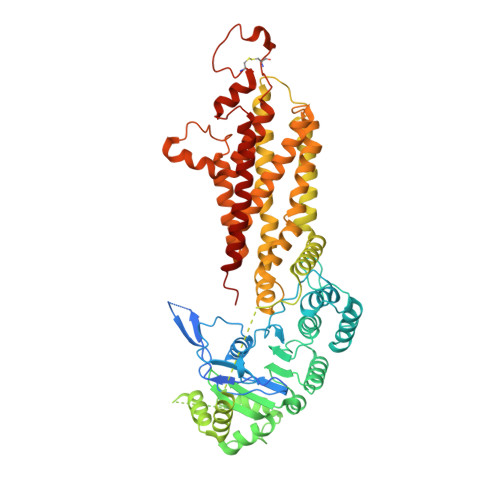Structures of ABCG2 under turnover conditions reveal a key step in the drug transport mechanism.
Yu, Q., Ni, D., Kowal, J., Manolaridis, I., Jackson, S.M., Stahlberg, H., Locher, K.P.(2021) Nat Commun 12: 4376-4376
- PubMed: 34282134
- DOI: https://doi.org/10.1038/s41467-021-24651-2
- Primary Citation of Related Structures:
7OJ8, 7OJH, 7OJI - PubMed Abstract:
ABCG2 is a multidrug transporter that affects drug pharmacokinetics and contributes to multidrug resistance of cancer cells. In previously reported structures, the reaction cycle was halted by the absence of substrates or ATP, mutation of catalytic residues, or the presence of small-molecule inhibitors or inhibitory antibodies. Here we present cryo-EM structures of ABCG2 under turnover conditions containing either the endogenous substrate estrone-3-sulfate or the exogenous substrate topotecan. We find two distinct conformational states in which both the transport substrates and ATP are bound. Whereas the state turnover-1 features more widely separated NBDs and an accessible substrate cavity between the TMDs, turnover-2 features semi-closed NBDs and an almost fully occluded substrate cavity. Substrate size appears to control which turnover state is mainly populated. The conformational changes between turnover-1 and turnover-2 states reveal how ATP binding is linked to the closing of the cytoplasmic side of the TMDs. The transition from turnover-1 to turnover-2 is the likely bottleneck or rate-limiting step of the reaction cycle, where the discrimination of substrates and inhibitors occurs.
- Institute of Molecular Biology and Biophysics, Department of Biology, ETH Zürich, Zürich, Switzerland.
Organizational Affiliation:



















